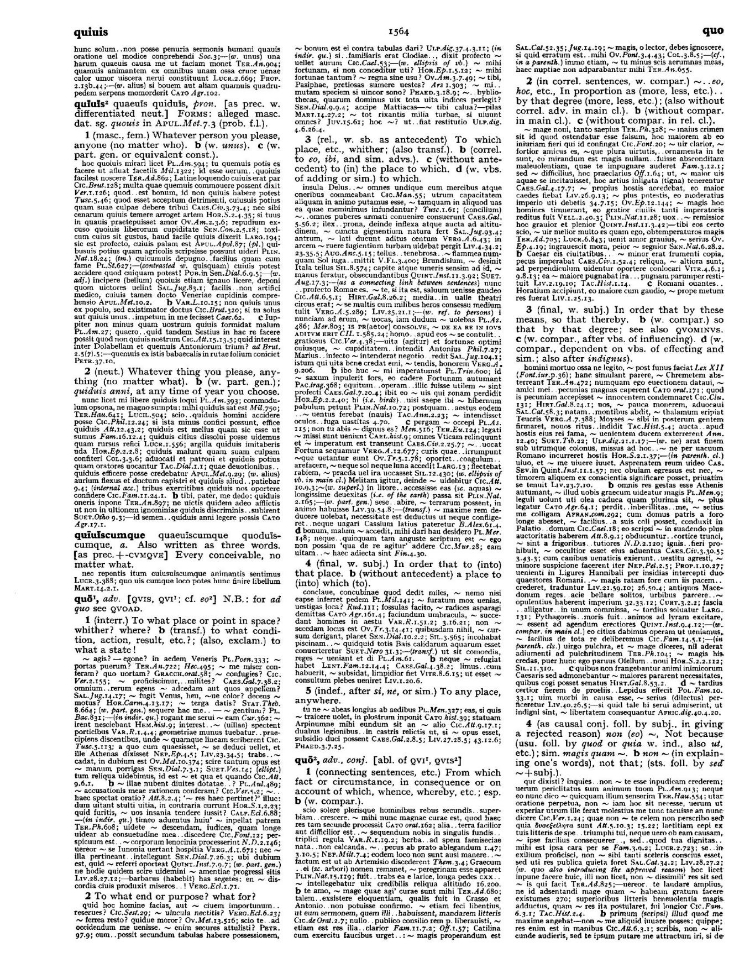
page_listing.tpl
page_subListingDetails.tpl
sub_listingDetails_style1.tpl
sub_listingDetails.title.tpl
quō where
quō is a Latin Adverb that primarily means where.
Definitions for quō
Wheelock's Latin
Adverb
- 1
to which or what place, whither, where
Oxford Latin Dictionary
Conjunction
- 1
(connecting sentences, etc.) From which fact or circumstance, in consequence or on account of which, whence, whereby, etc.; esp. (w. compar.).
- 2
(in correl. sentences, w. compar.) ~..eo, hoc, etc., In proportion as (more, less, etc.).. by that degree (more or less, etc.); (also without correl. adv. in main cl.). (b) without compar. in main cl.). (c) (without compr. in rel. cl.).
- 3
(final, w. subj.) In order that by these means, so that thereby. (b) (w. compar.) so that by that degree; see also QVOMINVS. (c) (w. compar., after vbs. of influencing). (d) (w. compar., dependent on vbs. of affecting and sim.; also after indignus).
Adverb
- 1
(interr.) To what place or point in space? whither? where? (b) (transf.) to what condition, action, result, et.?; (also, exclam.) to what a state!
- 2
To what end or purpose? what for?
Sentences with quō
Latin to English
Quō praemiō ille mōtus est?Compare By which reward was that man motivated?
Magister ā quō liber parātus est labōre superātur.Compare The teacher by whom the book was prepared is overcome with work.
Pīrātae rogābant quō iter facerēmus.Compare The pirates were asking to where we were making a journey.
Quō iter facitis?Compare To where are you making a journey?
Nullius addictus iurare in verba magistri, quo me cumque rapit tempestas, deferor hospes.Compare I am not bound over to swear allegiance to any master: where the wind carries me, I put into port and myself at home.
Data sources
Notes
- Definitions
- Frederick M. Wheelock, Wheelock's Latin, 6th ed., rev. Richard A. LaFleur (New York, NY: HarperCollins Publishers, 2005): 485.
- P. G. W. Glare, Oxford Latin Dictionary, Vols. 1-8 (Oxford: Clarendon Press, 1982): 1564.
- Word frequencies
- Christopher Francese, "Latin Core Vocabulary," Dickinson College Commentaries, last modified 2014, http://dcc.dickinson.edu.
- Paul B. Diederich, The Frequency of Latin Words and Their Endings, PhD diss., (Columbia University, 1939).
- Louis Delatte, Suzanne Govaerts, Joseph Denooz, and Etienne Evrard, Dictionnaire fréquentiel et index inverse de la langue latine [Frequency Dictionary and Inverse Index of the Latin Language] (Liège, Belgium: Laboratoire d'analyse statistique des langues anciennes de l'Université de Liège [L.A.S.L.A.], 1981): 125.
Bibliography
Allen, Joseph H. Allen and Greenough's New Latin Grammar for Schools and Colleges: Founded on Comparative Grammar. Edited by James B. Greenough, George L. Kittredge, Albert A. Howard, and Benjamin L. D'Ooge. Boston, MA: Ginn & Company, 1903.
Crystal, David. A Dictionary of Linguistics and Phonetics. 6th ed. Oxford, UK: Blackwell Publishing, 2008.
Delatte, Louis, Suzanne Govaerts, Joseph Denooz, and Etienne Evrard. Dictionnaire fréquentiel et index inverse de la langue latine [Frequency Dictionary and Inverse Index of the Latin Language]. Liège, Belgium: Laboratoire d'analyse statistique des langues anciennes de l'Université de Liège (L.A.S.L.A.), 1981.
Diederich, Paul B. The Frequency of Latin Words and Their Endings. PhD diss., Columbia University, 1939.
Francese, Christopher. "Latin Core Vocabulary." Dickinson College Commentaries. Last modified 2014. http://dcc.dickinson.edu/latin-vocabulary-list.
Gildersleeve, Basil L., and Gonzales Lodge. Gildersleeve's Latin Grammar: Third Edition, Revised, and Enlarged. 3rd ed. London, England: Macmillan and Co., 1903.
Glare, Peter G.W. Oxford Latin Dictionary. Vols. 1-8. Oxford, England: Clarendon Press, 1982.
Krüger, Bernd. "Latin Conjugation Tables." Cactus2000. Accessed May 5, 2023. https://latin.cactus2000.de/index.en.php.
Pierson, Nick. "Sound of Text." Accessed October 26, 2019. https://soundoftext.com.
Wheelock, Frederick M. Wheelock's Latin. 6th ed. Revised by Richard A. LaFleur. New York, NY: HarperCollins Publishers, 2005.
Wiktionary Contributors. "Victionarium." Wikimedia Foundation, Inc. Updated March 18, 2019. https://la.wiktionary.org/wiki/Victionarium:Pagina_prima.
Citation
Chicago (17th ed.)
Allo Contributors. "quō (adv.) - Latin Word Definition." Allo Latin Dictionary. Last modified . Accessed February 15, 2026. http://ancientlanguages.org/latin/dictionary/quo.
Entry created on . Last updated on .







